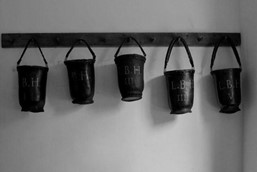A history of Loughborough’s battle with fire – 1500 to 1667
15 November 2020
by John Gibson
Disastrous Fires
From the mid-1500’s onwards, with the town being built predominately of timber, all writers mentioning Loughborough speak of it as having suffered much from fire. Amongst others, the editor of the ‘Magna Britannia’ in 1720 says:-
‘Of late years it hath undergone many calamities by fire, insomuch that it hath been almost quite destroyed by this merciless element.’
Nichols, writing in about 1800, doubts if Loughborough can be ‘supposed to be the second market town of note in the county’ on the grounds that ‘it hath been much diminished by fire.’
The earliest record of firefighting appliances in the town is this entry in the parish register:
‘1552 November 23 John Goodwyn sonne of Will’m. Goodwyn being a mercer and grocer in London did gyve x1 buckettes of lether wch are in the churche of Loughborwoe in Ao 1592 to the use and benefit of this town.‘
In 1607 the Burton Feoffees paid for mending the leather buckets.

The 17th century was remarkably disastrous for extensive fires in Loughborough. The Parish Register preserves this record of an outbreak in June 1622:
‘Memon. That the fourthe day of this month ther was a verie greevous fyer in this towne, wch burnte downe to the ground manie houses. Huigh, the sonne of Symon Ffoster, Elizabeth, the daughter of Thos. Greenwood (bur. the vth day) these two children weare burnte wth the aforesaid fire.‘
In 1642 there was
‘Paid. to 24 men that watcht and worked at the Fyer at Cutler’s house twelve shillings’;
‘to John Reynolds for a Pound of candles for their use four pence’; and
‘to Robert Sharpe for gathering ye bucketts at the Fyer sixpence.’
Practical sympathy with sufferers through fire in other places was expressed in 1653 when £4 17s 5d was collected in Loughborough towards a relief fund for losses occasioned by a disastrous fire at Marlborough.
The most destructive fires in the whole of Loughborough’s history occurred in 1666 on an eventful October day only a few weeks after the Great Fire of London. Ralph Hope of Coventry, writing on October 8 of that year to Joseph Williamson of the ‘London Gazette’ says:
‘On Friday the 5th a lamentable fire happened at Loughborough, a considerable town in Leicestershire; it destroyed nearly 200 houses, and had not the wind turned, might have destroyed the whole town; it began in a kiln.’
Writing again on October 17th he adds
‘The fire at Loughborough was very strange: a flake of fire was seen to fly from the house first on fire, 200 yards, over several thatched houses and a great rick of barley, without hurting them.’
Rather curiously, the only reference to this event at the time in the Parish Register is this brief entry:-
‘Oct 5th. This day ye great fire began at Thomas Webster’s house and bourned to Edward Blores in ye Pinfould Gate, sad to behold.’
Another destructive outbreak, however, occurred the following November, and the two fires were the subject of a brief issued by King Charles II, dated March 1, 1667 and published at the Parish Church:
‘Whereas, we are credible given to understand, as well by the humble supplication and petition of our poor distressed subjects that upon Friday, the 5th day of October last at Loughborough aforesaid, by the providence of Almighty God, there happened, about 12 o’clock in the day time, a sad and lamentable fire which, by the space of two hours, burnt and consumed down to the ground 50 dwelling houses, with malt-houses, barns, stables, kilns, and other out-houses thereunto belonging, containing 230 bays of buildings, with much malt, corn, grain, and hay therein; together with many stacks, ricks, and hovels of corn and hay, to the value of £1,924 1s 4d. And that, at Loughborough aforesaid, there happened another fire; which burnt to the ground, in a short time, seven bays of buildings; some of them filled with corn; and the loss did amount thereby to the sum of £50 10s 6d.‘
The sympathy of Leicester people towards their stricken neighbours is shown by the Corporation subscribing £15 to relief of the sufferers.
It must have been these two calamities which convinced the town that better fire prevention methods were called for, and a fire engine was built, apparently a homemade one. Notwithstanding these disastrous experiences another eighteen years passed before the town was provided with better means of dealing with fires.
John Gibson is a member of Loughborough Library Local Studies Volunteers and the author of ‘Loughborough’s Battle Against Fire 1592-1974’. Read about his book here.